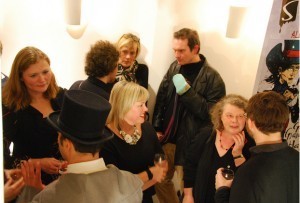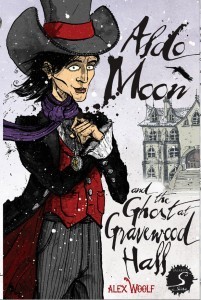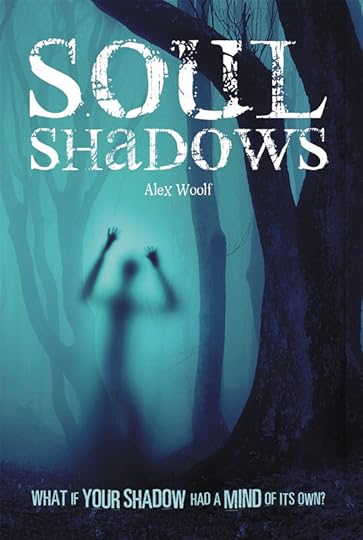Alex Woolf's Blog, page 3
March 25, 2013
ALDO launch party 13 February 2013
The launch party for Aldo Moon was held on 13 February 2013 at the offices of the Salariya Book Company in Brighton. I decided to dress up…
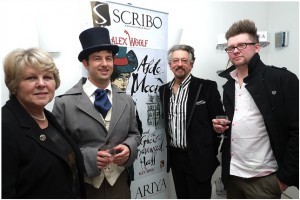
l-r: Roberta Bailey, me, David Salariya, David Procter
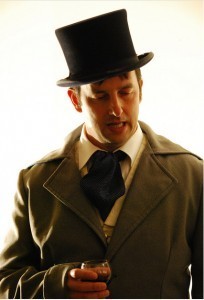
Attempting to give a speech after a little too much wine.
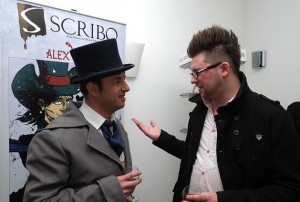
Chatting with David Procter, who created the superb cover illustration.
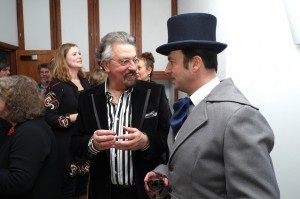
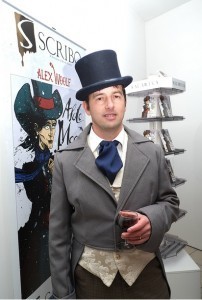
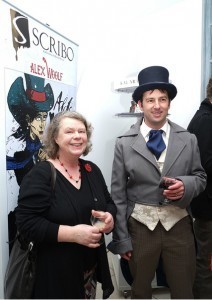
With fellow Salariya author Jane Hissey.
February 8, 2013
Moon Launch!
Aldo Moon and the Ghost at Gravewood Hall was published on 1 February. It’s been a busy week, so I’ve only got round to mentioning it now. I’ve been head down writing the final chapter of my latest Fiction Express story, the similarly titled ‘The Ghost of Grimstone Grange’. (I just know I will get those two titles mixed up in interviews!) Anyway, I’m so happy that Aldo is finally out there in the world. He’s been living inside my head for ever such a long time. His character long predates this story. Originally he was a detective living in the modern day. Then the publisher suggested setting his story in Victorian times. It was surprisingly easy to make this change, and I think that’s because there is something timeless about him. I think he would have thrived in any era – more like Doctor Who than Sherlock Holmes. But instead of travelling through time like the Doctor, he feels its passage like a current in a river. He can sense impending events as disturbances in the current or, as Aldo would put it, ripples in the ether. I’m looking forward to seeing how he fares, now that he’s left the sanctuary of my brain. Actually, I know he’ll be okay. It’s me I’m concerned about. I’m going to be interviewed about the book on Wednesday, and then I’ll be talking to a group of 35 kids about it at the Imagine Children’s Festival on Saturday. I hope I can do the book, and Aldo, justice!
January 21, 2013
Honorable Mention
I am delighted to announce that my book, Living Through The Arab-Israeli War Since 1948, which was published last year by Raintree, has received an Honorable Mention in the Middle East Outreach Council Book Awards for 2012.
The award recognizes books that contribute to an understanding of the Middle East and its component societies and cultures. Books are judged on the authenticity of their portrayal of a Middle Eastern subject, as well as on characterization, plot, and appeal for the intended audience, and awarded in three categories: picture books, youth literature, and youth nonfiction.
The judges applauded the book saying, “Living through the Arab-Israeli War since 1948 is commended as an excellent resource on the Arab Israeli conflict because of its ‘honest attempt to present both sides while not offending any moderates.’ It is also very readable, making a complex subject accessible to a high school audience.”
January 14, 2013
Snowbound
There’s a scene in my latest book, Aldo Moon and the Ghost at Gravewood Hall, where Aldo and his companions are marooned in a remote country house (the Gravewood Hall of the title) after a night of heavy snow. The book is set in the 1880s, and when I wrote that scene, I had to think about what it must be like to be without telephone or Internet connections, four-wheel drive cars or tarmac roads. In those days, being cut off meant exactly that. You might as well be adrift at sea. To add to the visitors’ discomfort, there are untoward happenings in the house – strange sounds and ghostly disturbances at night –and they must contend with the open hostility of their hostess’s son. The house itself is old, dilapidated and mildewy. This is not a place you would wish to be stuck in for any length of time.
The house I live in is not particularly old (when Aldo Moon was strutting his stuff, this corner of North London was mostly still forest). Neither is my dwelling dilapidated or especially mildewy. There are no spooky bumps in the night – though it does have quite eccentric plumbing, causing strange rattling sounds in the early hours of the morning. Nevertheless, I was reminded of this scene in my book as I looked out of the window at seven o’clock this morning and saw the giant snowflakes tumbling down all around us. My Internet connection was down again and I was cursing loudly because I had lots of work to do. I felt cut off from the world in an almost Victorian way. Of course I could have headed off to Starbucks with my laptop and done some work there. But my imagination took me in another direction…
I turned off the heat and light and switched off my phone and computer. I put on an extra jumper, lit a candle and took out an old fountain pen and a sheaf of paper. The snow muffled the sound of the cars in the street outside. The candle cast a cosy glow over my desk. It took a while to get used to writing longhand again, but gradually the words began to flow, and there was something magical about the soft, steady scratch of my pen amid all that silence.
After a few minutes, I consulted my pocket watch and discovered to my surprise that four hours had gone by. I wanted to continue, but hunger forced me from my desk. I went downstairs, where the noise of the kettle and the toaster soon brought me out of my spell. By now the Internet was restored, and I simply had to check Facebook and Twitter. It was time to reconnect with the world.
Aldo Moon and the Ghost of Gravewood Hall will be published by Scribo on 1 February 2013.
December 19, 2012
The Next Big Thing: Soul Shadows
The Next Big Thing is a blog meme in which writers take turns to talk about their latest projects. I was kindly tagged by Rebecca Lisle, who last week wrote about her soon-to-be-published book, The Spin. As for me, I’ve got two books coming out in 2013. Today, I’m going to talk about the second of these, which is publishing in April…
What is the title of your next book?
Soul Shadows
Where did the idea for the book come from?
I’ve always been scared of shadows, especially my own. It’s got to the point that when I’m out at night, I always try to walk with the moon behind me, so my shadow remains in full view at all times. What you see can’t hurt you, right? But if it’s behind you, who knows what it might be up to? The idea of my shadow coming to life is so horrifying, I decided I had to write about it to get the fear out of my system. So Soul Shadows was really therapy for me. It didn’t work, but it was fun to do.
What genre does your book fall under?
YA horror.
What actors would you choose to play the part of your characters in a movie rendition?
For Estelle, I imagine Alessandra Torresani. For Sandor, a young Eric Bana.
What is the one-sentence synopsis of your book?
Two young people, trapped in an isolated part of the English countryside, are terrorised by shadows that come to life.
Will your book be self-published or represented by an agency?
It will be published by Curious Fox in April 2013.
How long did it take you to write the first draft of the manuscript?
I wrote it in exactly 11 weeks. I know this because there are 11 chapters and I wrote a chapter a week. I had no choice because I wrote it originally for Fiction Express, an online interactive publisher, and they demanded a chapter a week. They’d post each chapter on the website as soon as I’d finished it. There was always a cliff-hanger ending, and readers had to vote on how the story should continue. So I have to say a big thanks to all those Fiction Express readers out there for their help in navigating the many twists and turns of this story. Since then, the story’s rough edges have been smoothed out, its prose has been sharpened up, and its inconsistencies have been rectified, ready for its print incarnation. I have to say another big thank you to my editor at Curious Fox, Vaarunika Dharmapala, for helping me with that, and also for helping me inject some added depth into Estelle and Sandor’s relationship.
What other books of the same genre would you compare yours with?
‘Frankenstein’, by Mary Shelley and ‘Strange Case of Dr Jeckyll and Mr Hyde’, by Robert Louis Stevenson.
Who or what inspired you to write this book?
I’ve long been intrigued by the effects of prolonged isolation on a person and how this might affect them, and I’ve been wanting to write a book with such a character for quite a while. Estelle is that character. A few years before this story begins, she was locked in an attic by her mother for several months, and she’s still haunted by that experience. So this is as much a story about the shadows of the past – shadows of the mind – as it is those dark things that follow you around.
What else about your book might pique the reader’s interest?
There’s a strong dystopian, science fiction theme running through the book. It’s about evil scientists and the animation of dead matter. It’s about probing into realms that are best left alone. If you like some of the more thoughtful episodes of Dr Who – the ones that make you think as well as make you scared – then you should like Soul Shadows.
The next writer to be tagged is… to be confirmed!
December 5, 2012
‘The Next Big Thing’ Blog Meme on 5 December
The Next Big Thing is a blog meme in which writers take turns to talk about their latest projects. I was kindly tagged by Annabel Pitcher, who last week wrote about her soon-to-be-published book, Ketchup Clouds. As for me, I’ve got two books coming out in early 2013. Today, I’m going to talk about the first of these, which is publishing in February…
What is the title of your next book?
Aldo Moon and the Ghost at Gravewood Hall.
Where did the idea for the book come from?
The character of Aldo Moon was the starting point. For years I’ve wanted to write about a young detective with supernatural powers. The publisher asked me if I could set it in Victorian times, so I fitted him out with a battered top hat and a mysterious pocket watch which allows him to pick up ‘ripples in the ether’. I gave him two ‘sidekicks’ – a sceptical female character (think Scully from The X-Files in a corset), and a male ‘Watson’ type character who serves as the story’s narrator. Now all I needed was a good story. I spent weeks hunting around the darker histories of the 1880s. Eventually, in a footnote near the back of a dusty old tome in a forgotten corner of my local library, I found something. It was only a few lines, but it sparked an idea, which became the germ of a plot. I can’t say what it was that I found because it would be a massive plot spoiler. Read the book first, then maybe I’ll tell you.
What genre does your book fall under?
It’s multi-genre really: historical, crime, supernatural, with just a touch of horror. The book is aimed at 11 to 14 year olds, but I hope it will appeal to older teenagers and adults, too.
What actors would you choose to play the part of your characters in a movie rendition?
A few years ago, I’d have said Johnny Depp would have been perfect for Aldo Moon, with Helena Bonham Carter as the prim, sceptical Lily Morelle (and Tim Burton directing, of course!). Now, I’m not so sure. Perhaps Thomas McDonell playing opposite Emma Watson or Kristen Stewart?
What is the one-sentence synopsis of your book?
A teenage Victorian detective with supernatural powers investigates a haunted house.
Or, if we’re doing film mash-ups: Sherlock Holmes meets Paranormal Activity.
Will your book be self-published or represented by an agency?
It will be published by Scribo, an imprint of the Salariya Book Company, in February 2013. You can pre-order it from Amazon here.
How long did it take you to write the first draft of the manuscript?
It took me approximately eight weeks. (Once I get excited about a story, I’m quite a fast writer.)
What other books of the same genre would you compare yours with?
You could compare it to the Young Sherlock Holmes stories by Andrew Lane, but with a supernatural twist.
Who or what inspired you to write this book?
I was inspired by the challenge of writing a story that was different from anything I’d ever written. I had three main aims when I began. Firstly, I wanted to write a ghost story that would scare me as much as some of the stories I’ve read by other authors. Secondly, I wanted to create a set of memorable characters that the reader would identify with and care about. Finally, I wanted to write a whodunnit with a truly surprising twist that no reader could possibly guess. Readers can judge whether I succeeded in any or all of these aims.
What else about your book might pique the reader’s interest?
Readers of historical fiction might enjoy the fact that I’ve woven a few real historical events into the narrative, including a train crash, a fire at Charing Cross, and a famous criminal trial – all of which directly impact on the plot and the characters. Lovers of ghost stories will, I hope, approve of Gravewood Hall. It’s a creepy, crumbling, haunted house in the tradition of all great creepy, crumbling, haunted houses, and even boasts its very own sinister housekeeper, Mrs Haverhill. Oh, and the book also contains a beautifully drawn map, including a layout of the house and the local village – so you may get scared, but hopefully you won’t get lost!
The next writer to be tagged is the wonderfully talented Sharon Gosling. Look out for her blog very soon.
October 15, 2012
To Boldly Allude…
Last year I was writing a horror story called ‘Soul Shadows’ and I needed a couple of characters whose purpose was essentially to provide fodder for the monster. As well as furnishing my sacrificial lambs with rudimentary personalities (to give their deaths some level of meaning in readers’ minds), I had to come up with names for them. To help me in this task, I started thinking about the role of these two characters in my story, and I was immediately reminded of those 1960s Star Trek episodes, when, if you wore a red shirt and were beamed onto a planet, your death was pretty much a foregone conclusion. It occurred to me that there would have had to be a whole stable of bit-part actors in those days whose sole purpose was to get blasted, vaporised or eaten within ten minutes of materialising on the surface of Exma III (or whatever the planet happened to be called). It was the work of just a few minutes on Wikipedia to dig out the names of a couple of these extras, and guarantee their immortality by affixing them to my own pair of bit players. As well as enjoying this arcane nominal coupling for its own sake, I also felt I was, in my own small way, honouring these young actors of yore for their gallant, unheralded contributions to my Saturday evening entertainment all those years ago.
I love planting obscure references and allusions in my fiction – the obscurer the better. I don’t know if anyone will pick up on them and that’s not really the point. In fact, that may be the opposite of the point. I actually like the fact that I may be the only person in the world who knows why Character A happened to be honeymooning in Hotel B in the summer of 19XX. Many of my allusions are to other works of mine. A major character from one story may make a cameo appearance in another. She may not even be named, but I know it’s her, and that’s enough to give me a tingle of satisfaction. As it happens, quite a few of my stories, when they’re not set in an alternative London, are located in the fictional county of Wintershire – though I rarely mention the fact in the text. With this in mind, it’s less surprising, I suppose, that characters from different stories sometimes run into each other.
There’s no name for this disease of obsessive cross-referencing. Some may view it as unhealthily incestuous, maybe even cannibalistic – but I simply can’t (or don’t want to) help it. And occcasionally it can prove useful. Earlier this year, I wrote a couple of middle-grade stories about a pair of young time travellers. Right at the start of the first story, a German World War II fighter plane crashes into an English church in August 1940. The incident had no bearing on the plot, and seemed pointless at the time, even to me, except that it served to give the story a dramatic opening. The publisher was fine with it, but I wasn’t. I was determined to find some significance in this event, and eventually I did – in the second story. It turned out that the entire motivation of the second story’s main antagonist hinged on the plane crash. A trivial incident in the first story became a pivotal one in the second. So sometimes this disease of mine bears unexpected, creative fruit.
October 1, 2012
Thoughts on the existence of God
The universe seems to me to be both an objective and a subjective place, containing both external and internal realities. There are objective truths that can be proved by science and reason. There are also subjective truths – concepts or ideas that cannot be proved by science or reason, but which are nevertheless entirely real to the people who believe in them. God seems to be a subjective truth.
Two kinds of truth
Both kinds of truth are of equal importance, and neither should be considered superior or inferior to the other. Objective truths have practical usefulness. We need the truths discovered by science and reason in order to enjoy long, healthy and stimulating lives. Subjective truths are just as important. We love our partners, our parents, siblings and children. We hate certain foods or kinds of music. We put people on pedestals or we despair of them. Paintings, conversations and sunlit valleys fill our internal, subjective landscapes. The thoughts and beliefs these stimuli provoke are just as valid to us as the facts we obtain through rational thought and scientific discovery.
Either something exists or it does not
For most people, the statement: ‘either something exists or it does not’ would seem to be a pretty fair one. A horse exists. A square circle doesn’t. However, in the case of subjective phenomena, such as God, I would argue that this statement is not valid. I believe that God, as a subjective entity, can simultaneously exist and not exist. He can exist as a subjective reality for believers, and at the same time not exist as a subjective reality for non-believers.
Why try to prove God’s existence?
There have been many attempts to prove the existence of God – to bring what is subjective into the world of the objective. Among philosophers, there is the ontological argument, the cosmological argument and the design argument. But these seem to me to be a case of applying the wrong set of tools to a problem. It is like trying to understand love or jealousy by studying the chemical processes in the brain. For me, it is enough to say that, for some people God exists, and for others he does not. This is where the matter should end. We should accept that God is part of some people’s internal, subjective landscapes, and for others, he is not.
Confusing subjective and objective realities
For some religious people, the statement ‘God exists’ may feel like an objective, provable fact – equivalent to the statement ‘bees make honey’. This is because they aren’t making a distinction between objective and subjective realities. It’s like a football fan believing that his team is brilliant with the same conviction that he believes one plus one make two.
For me, this confusion of the subjective and objective worlds is the cause of much of today’s strife. It is the reason for religious warfare, terrorism, hatred and persecution. For a more harmonious life, we need to try and separate out objective and subjective truths, both in ourselves and in other people. People of faith should recognise that their belief in God is a subjective truth, and that not everyone shares this subjective truth. This is not to diminish God or their faith – for subjective truth, as I have already stated, is as important as objective truth. In other words, God still exists – but only for them and their fellow believers.
Atheists should also recognise and honour the existence of God as a subjective truth for other people. They should not look down on believers or despise them for their ignorance. They should remember that we all have subjective truths, it’s just that an atheist’s does not include a belief in God.
What about the afterlife?
The afterlife is an example of a place where subjective and objective realities would seem to collide. Many religious people believe in the concept of an afterlife, whereas non-religious people do not. The statement ‘either something exists or it does not’ would seem to apply here. There’s no wriggle room. This is because we are no longer talking about belief, but experience. We might be able to claim that belief in God or the immortal soul is an example of a subjective truth, but experience, such as life after death, seems to be a ‘something’ that either exists or does not.
To this powerful argument, I would reply that when someone dies, the subjective experience of an individual either continues or it does not. If it continues, then that person experiences an afterlife. If it doesn’t, then he or she experiences nothing – the subjective dies along with the subject, so maybe the whole question becomes irrelevant.
Or maybe not: if life does continue after death, doesn’t this mean that subjective truth becomes objective truth? Doesn’t it mean that God is real in the objective as well as the subjective sense? I would say no, for if there is an afterlife, it is likely to be a completely subjective one, since there is no objective evidence that it exists. Therefore one still cannot say that God exists in an objective sense.
Similarly, if life doesn’t continue after death, does it somehow prove that there is no such thing as subjective truth, that there is only truth and untruth, and God has been proved as an untruth. I would answer no to this as well, because the lack of an afterlife does not invalidate the subjective truth of an afterlife for those who believe in it. Subjective truth does not, after all, have to be provable or true in the objective sense. Its lack of provability, even its lack of objective reality, does not diminish the truth of its subjective reality in the mind of the believer.
August 31, 2012
New Chronosphere Video
The Perfect 22nd century experience.
Live a year in the space of a minute.
New Chronosphere video from Salariya
Soul Shadows – the latest cover design!
When Estelle’s therapist sends her to a remote cottage as part of her recovery from a traumatic incident, she is immediately aware of a strange presence about the place. There is a dark shadow surrounding the nearby wood that seems suspicious. At first, the silence is oppressive, but then she begins to hear strange noises. Are they real or just part of her overactive imagination? In her fear and panic she tells her friend Sandor – someone she thinks she can trust.
Is there something sinister lurking in the shadows? And can Estelle and Sandor discover what’s going on in the nearby military laboratory before it’s too late?
Publisher: Curious Fox
Publication date: 15/04/2013

